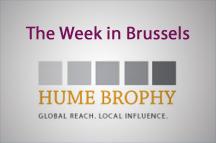All change?
The politically turbulent 2016 is drawing to a close, and there’s been a sense this week that preparations for what looks like a choppy 2017 are underway.
While Angela Merkel announced that she will run for her fourth term in next year’s national elections in Germany, French voters boosted François Fillon and booted out Nicolas Sarkozy in the first round of primaries to choose Les Républicains’ presidential candidate. All eyes are now on whether Matteo Renzi will survive into the new year after Italy’s constitutional referendum next weekend.
 Meanwhile, after months of speculation, European Parliament President Martin Schulz finally announced his decision to stand for election in Germany in 2017 rather than seek another term in his current role. This opens up the race among MEPs to replace him. Under a previous deal between the socialists that Schulz represents and the centre-right EPP group, it is ordinarily the EPP’s “turn” to take over the Presidency. This would result in the conservatives holding the top jobs in the European Commission, Parliament and Council. Ireland’s Mairead McGuinness, French MEP Alain Lamassoure, former Slovenian PM Alojz Peterle, and former EU Commissioner Antonio Tajani from Italy are known candidates. But fiery federalist and liberal group leader Guy Verhofstadt may still have his own ambitions. Watch for an unseemly scramble.
Meanwhile, after months of speculation, European Parliament President Martin Schulz finally announced his decision to stand for election in Germany in 2017 rather than seek another term in his current role. This opens up the race among MEPs to replace him. Under a previous deal between the socialists that Schulz represents and the centre-right EPP group, it is ordinarily the EPP’s “turn” to take over the Presidency. This would result in the conservatives holding the top jobs in the European Commission, Parliament and Council. Ireland’s Mairead McGuinness, French MEP Alain Lamassoure, former Slovenian PM Alojz Peterle, and former EU Commissioner Antonio Tajani from Italy are known candidates. But fiery federalist and liberal group leader Guy Verhofstadt may still have his own ambitions. Watch for an unseemly scramble.
Brexit bravado
As the Parliament’s Brexit negotiator, Verhofstadt allegedly welcomed UK Secretary of State for Exiting the European Union, David Davis, into his office with the words “Welcome to hell”. The Parliament’s leadership will next week meet the European Commission’s chief negotiator, Michel Barnier, where they will set out their three principles for the negotiations: the four fundamental freedoms (goods, services, capital and people) are not negotiable; any transitional arrangements agreed with the UK must have an end date to prevent them from becoming permanent; and Parliament must be fully involved in the negotiations from the beginning.
Despite being nominated as his EFDD Group’s Brexit observer, Nigel Farage MEP, UKIP’s past and present leader, is unlikely to be welcome at that meeting. He may anyway be transatlantic – he was overheard this week telling colleagues in Strasbourg that it would be “crackers” for the British Government not to deploy him as the UK-US go-between.
Breaking up is hard(er) to do
Not the UK and EU this time, but insolvent businesses. In a sign of the times, the European Commission has proposed introducing insolvency rules that provide an opportunity for companies in financial difficulty to restructure early and avoid job losses rather than declaring themselves bankrupt. Vice-President Dombrovskis said viable companies “should be given a second chance” and much has been made of the similarity to the US’s Chapter 11 model.
What’s new about this proposal is its venture into the pan-European. The idea is to focus on providing legal certainty to cross-border investors and creditors who want to lend in other EU countries, and pushing the development of capital markets in Europe. All the same, it stops short of attempting to harmonise national insolvency rules – even the Commission realises this would be politically impossible today.













